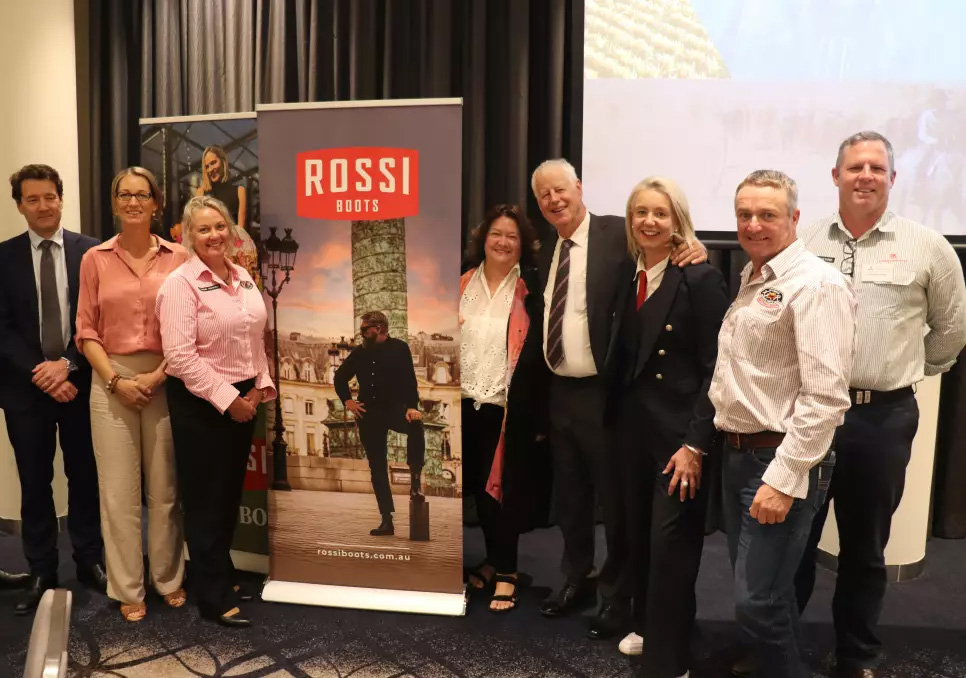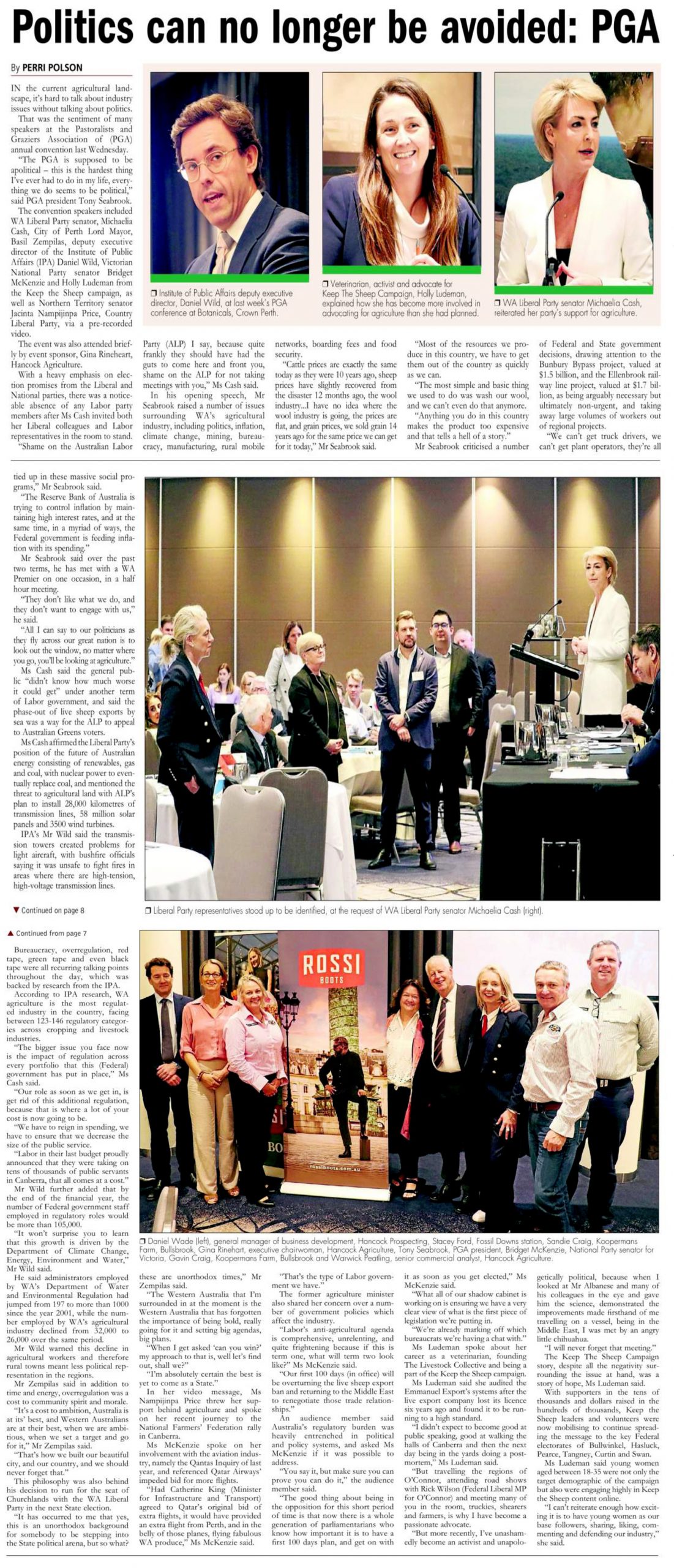
Article by Perri Polson, courtesy of Farm Weekly.

IN the current agricultural landscape, it’s hard to talk about industry issues without talking about politics.
That was the sentiment of many speakers at the Pastoralists and Graziers Association of (PGA) annual convention last Wednesday.
“The PGA is supposed to be apolitical – this is the hardest thing I’ve ever had to do in my life, every-thing we do seems to be political,” said PGA president Tony Seabrook.
The convention speakers included WA Liberal Party senator, Michaelia Cash, City of Perth Lord Mayor, Basil Zempilas, deputy executive director of the Institute of Public Affairs (IPA) Daniel Wild, Victorian National Party senator Bridget McKenzie and Holly Luedman from the Keep the Sheep campaign, as well as Northern Territory senator Jacinta Nampijinpa Price, Country Liberal Party, via a pre-recorded video.
The event was also attended briefly by event sponsor, Gina Rinehart, Hancock Agriculture.
With a heavy emphasis on election promises from the Liberal and National parties, there was a noticeable absence of any Labor party member after Ms Cash invited both her Liberal colleagues and Labor representatives in the room to stand.
“Shame on the Australian Labor Party (ALP) I say, because quite frankly they should have had the guts to come here and front you, shame on the ALP for not taking meeting with you,” Ms Cash said.
In his opening speech, Mr Seabrook raised a number of issues surrounding WA’s agricultural industry, including politics, inflation, climate change, mining, bureaucracy, manufacturing, rural mobile networks, boarding fees and food security.
“Cattle prices are exactly the same today as they were 10 years ago, sheep prices have slightly recovered from the disaster 12 months ago, the wool industry… I have no idea where the wool industry is going, the prices are flat, and grain prices, we sold grain 14 years ago for the same price we can get for it today,” Mr Seabrook said.
“Most of the resources we produce in this country, we have to get them out of the country as quickly as we can.
“The most simple and basic thing we used to do was wash our wool, and we can’t even do that anymore.
“Anything you do in this country makes the product too expensive and that tells a hell of a story.”
Mr Seabrook criticised a number of Federal and State government decisions, drawing attention to the Bunbury Bypass project, valued at $1.5 billion, and the Ellenbrook railway line project, valued at $1.7 billion, as being arguably necessary but ultimately non-urgent, and taking away large volumes of workers out of regional projects.
“We can’t get truck drivers, we can’t get plant operators, they’re all tied up in these massive social programs,” Mr Seabrook said.
“The Reserve Bank of Australia is trying to control inflation by maintaining high interest rates, and at the same time, in a myriad of ways, the Federal government is feeding inflation with its spending.”
Mr Seabrook said over the past two terms, he has met with a WA Premier on one occasion, in a half hour meeting.
“They don’t like what we do, and they don’t want to engage with us,” he said.
“All I can say to our politicians as they fly across our great nation is to look out the window, no matter where you go, you’ll be looking at agriculture.”
Ms Cash said the general public “didn’t know how much worse it could get” under another term of Labor government, and said the phase-out of live sheep exports by sea was a way of ALP to appeal to Australian Greens voters.
Ms Cash affirmed the Liberal Party’s position of the future of Australian energy consisting of renewables, gas and coal, with nuclear power to eventually replace coal, and mentioned the threat to agricultural land with ALP’s plan to install 28,000 kilometres of transmission lines, 58 million solar panels and 3500 wind turbines.
IPA’s Mr Wild said the transmission towers created problems for light aircraft, with bushfire officials saying it was unsafe to fight fires in areas where there are high-tension, high-voltage transmission lines.
Bureaucracy, overregulation, red tape, green tape and even black tape were all recurring talking points throughout the day, which was backed by research from the IPA.
According to IPA research, WA agriculture is the most regulated industry in the country, facing between 123-146 regulatory categories across cropping and livestock industries.
“The bigger issue you face now is the impact of regulation across every portfolio that this (Federal) government has put in place,” Ms Cash said.
“Our role as son as we get in, is get rid of this additional regulation, because that is where a lot of your cost is now going to be.
“We have to reign in spending, we have to ensure that we decrease the size of the public service.
“Labour in the last budget proudly announced that they were taking on tens of thousands of public servants in Canberra, that all comes at a cost.”
Mr Wild further added that by the end of the financial year, the number of Federal government staff employed in regulatory roles would be more than 105,000.
“It won’t surprise you to learn that this growth is driven by the Department of Climate Change, Energy, Environment and Water,” Mr Wild said.
He said administrators employed by WA’s Department of Water and Environmental Regulation had jumped from 197 to more than 1000 since the year 2001, while the number employed by WA’s agricultural industry declined from 32,000 to 26,000 over the same period.
Mr Wild warned this decline in agricultural workers and therefore rural towns meant less political representation in the regions.
Mr Zempilas said in addition to time and energy, oeverregulation was a cost to community spirit an morale.
“It’s a cost to ambition, Australia is at its’ best, and Western Australians are at their best, where we are ambitious, when we set a target and go for it,” Mr Zempilas said.
“That’s how we built our beautiful city, and our country, and we should never forget that.”
This philosophy was also behind his decision to run for the eat of Churchlands with the WA Liberal Party in the next State election.
“It has occurred to me that yes, this is an unorthodox background for somebody to be stepping into State political arena, but so what? These are unorthodox times,” Mr Zempilas said.
“The Western Australia that I’m surrounded in at the moment is the Western Australia that has forgotten the importance of being bold, really going for it and setting big agendas, big plans.
“When I get asked ‘can you win?’ my approach to that is, well let’s find out, shall we?”
“I’m absolutely certain the best is yet to come as a State.”
In her vide message, Ms Nampijinpa Price threw her support behind agriculture and spoke on her recent journey to the National Farmer’s Federation rally in Canberra.
Ms McKenzie spoke on her involvement with the aviation industry, namely the Qantas Inquiry of last year, and references Qatar Airways’ impeded bid for more flights.
“Had Catherine King (minister of Infrastructure and Transport) agreed to Qatar’s original bid for extra flights, it would have provided an extra flight from Perth, and in the belly of those planes, flying fabulous WA produce,” Ms McKenzie said.
“That’s the type of Labor government we have.”
The former agriculture minister also shared her concern over a number of government policies which affect the industry.
“Labor’s anti-agricultural agenda is comprehensive, unrelenting, and quite frightening because if this is term one, what will term two look like?” Ms McKenzie said.
“Our first 100 days (in office) will be overturning to the Middle East to renegotiate those trade relationships.”
An audience member said Australia’s regulatory burden was heavily entrenched in political and policy systems, and asked Ms McKenzie if it was possible to address.
“You say it, but make sure you can prove you can do it,” the audience member said.
“The good thing about being in the opposition for this short period of time is that now there is a whole generation of parliamentarians who know how important it is to have a first 100 days plan, and get on with it as soon as you get elected,” Ms McKenzie said.
“What all of our shadow cabinet is working on is ensuring we have a very clear view of what is the first piece of legislation we’re putting in.
“We’re already marking off which bureaucrats we’re having a chat with.”
Ms Ludeman spoke about her career as veterinarian, founding The Livestock Collective and being a part of the Keep the Sheep campaign.
Ms Ludeman said she audited the Emmanuel Export’s systems after the live export company lost its licence six years ago and found it to be running to a high standard.
“I didn’t expect to become good at public speaking, good at waling the halls of Canberra and then the next day being in the yards doing a postmortem,” Ms Ludeman said.
“But travelling the regions of O’Connor, attending road shows with Rick Wilson (Federal Liberal MP for O’Connor) and meeting many of you in the room, truckies, shearers and farmers, is why I have become a passionate advocate.
“But more recently, I’ve unashamedly become an activist and unapologetically political, because when I looked at Mr Albanese and many of his colleagues in the eye and gave him the science, demonstrated the improvements made firsthand of me travelling on a vessel, being in the Middle East, I was met by an angry little chihuahua.
“I will never forget that meeting.”
The Keep the Sheep Campaign story, despite all the negativity surrounding the issue at hand, was a story of hope, Ms Ludeman said.
With supporters in the tens of thousands and dollars raised in the hundreds of thousands, Keep the Sheep leaders and volunteers were now mobilising to continue spreading the message to the key Federal electorates of Bullwinkel, Hasluck, Pearce, Tangney, Curtin and Swan.
Ms Ludman said young women aged between 18-25 were not only the target demographic of the campaign but also were engaging highly in Keep the Sheep content online.
“I can’t reiterate enough how exciting it is to have young women as our base followers, sharing, liking, commenting and defending our industry,” she said.
















